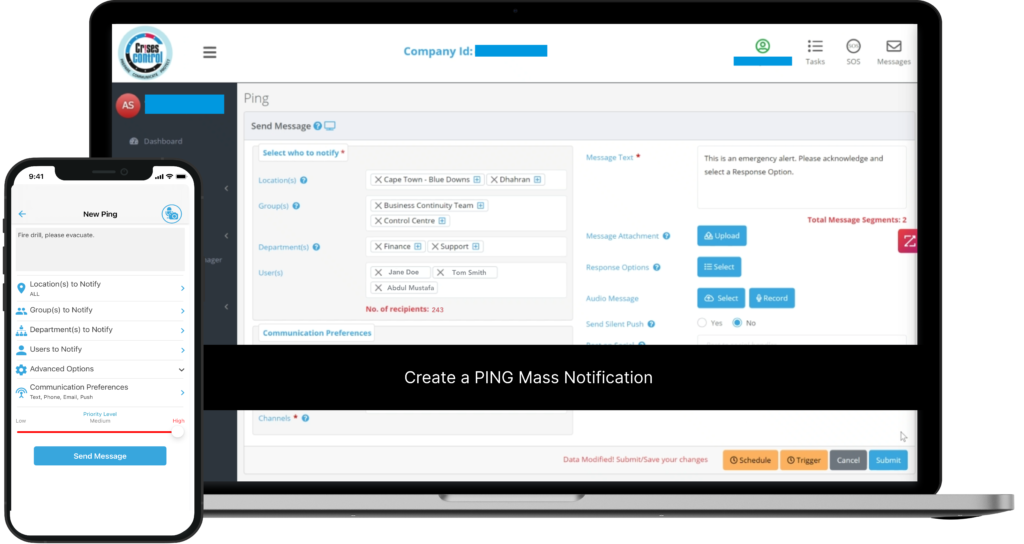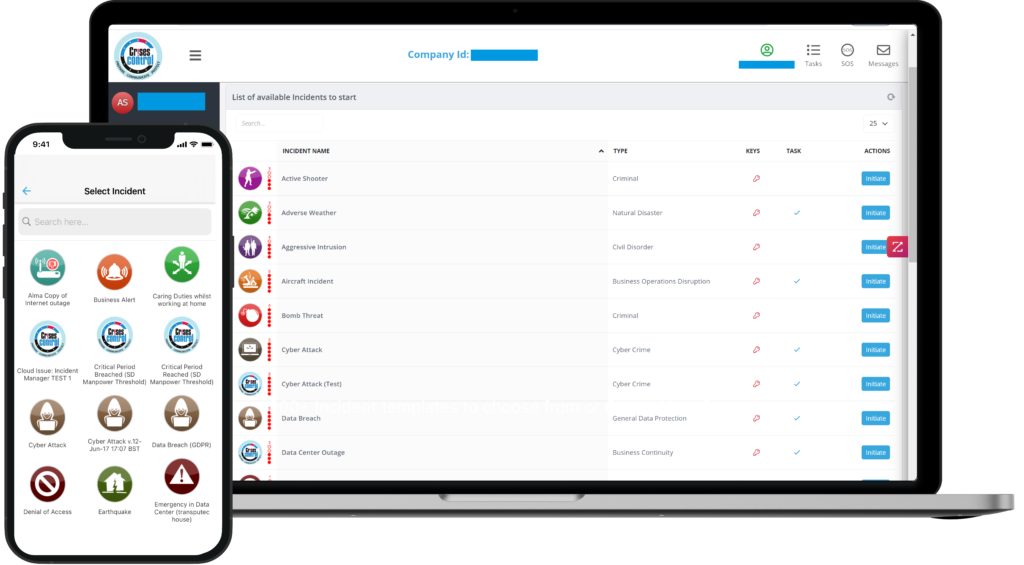Written by Sonny Sehgal | Board Member
Picture this: a power outage hits your company’s data centre during peak business hours, or a sudden storm disrupts your operations, leaving your employees in limbo. Without a mass communication system, your response could be chaotic and slow, amplifying the impact of the crisis and leaving your business vulnerable. Effective communication during such emergencies isn’t just a luxury—it’s a lifeline.
In this blog, we’ll delve into the critical role of mass communication systems in mitigating disaster impact, showcasing how Crises Control equips businesses with the tools to turn potential crises into manageable events.
The High Stakes of Unpreparedness
Examples of Communication Failures
Unpreparedness during a crisis can have dire consequences. Consider the case of a large financial institution that faced a cyber attack. The absence of a robust mass communication system meant that employees and stakeholders were left in the dark about the extent of the breach and the steps being taken to mitigate it. This lack of clarity led to confusion, increased panic, and a significant loss of trust among clients.
In another scenario, a company hit by a severe weather event struggled to coordinate the safety of its employees and manage operations due to a fragmented communication system. The delay in relaying critical information exacerbated the damage and resulted in operational downtime and financial losses.
Consequences of Ineffective Communication
- Disrupted Operations: Without immediate and clear communication, critical functions may be halted, leading to delays in response and recovery.
- Increased Risk: A lack of coordination can elevate safety risks, leading to potential harm to employees and assets.
- Financial Losses: Inefficiencies and prolonged downtimes can lead to significant financial repercussions.
- Damage to Reputation: Slow or poor communication can damage your brand’s reputation, eroding customer trust and loyalty.
How Mass Communication Systems Mitigate Crisis Damage
Immediate and Coordinated Response
A mass communication system enables rapid dissemination of critical information across multiple channels—SMS, email, voice calls, and push notifications. This immediacy is crucial in emergencies where every second counts. For example, during a fire evacuation, timely alerts can guide employees to safety and provide real-time updates on the situation.
Centralised and Consistent Messaging
Centralising communication through a single platform ensures that all stakeholders receive the same accurate information. This consistency helps prevent misinformation and confusion, which can otherwise spread quickly during a crisis. A well-designed mass communication system ensures that messages are uniform, reducing the risk of mixed signals.
Scalability and Flexibility
Modern mass communication systems are scalable, meaning they can grow with your business and adapt to different types of crises. Whether you’re managing a small incident or a large-scale emergency, the system can handle varying communication needs without compromising effectiveness. Additionally, integration with existing systems and workflows ensures seamless operation during emergencies.
Interested in our Ping Mass Notification Software?
Efficiently alert everyone in seconds at scale with our Mass Notification System – PING, get the message out fast and ensure rapid response and recovery.

Key Features of an Effective Mass Communication System
Real-Time Alerts
A mass communication system should provide real-time alerts that can be sent to employees, stakeholders, and emergency responders instantly. This feature ensures that everyone is informed of critical updates as soon as they happen.
User-Friendly Interface
The system should be easy to use, even for non-technical users. A user-friendly interface allows for quick setup and operation, ensuring that communication can be managed efficiently under pressure.
Integration Capabilities
Effective communication systems integrate seamlessly with your existing infrastructure. This includes compatibility with email systems, mobile apps, and emergency management tools, allowing for a cohesive approach to crisis management.
Analytics and Reporting
Advanced analytics and reporting tools help track the effectiveness of your communication efforts. By analysing data on message delivery, response times, and user engagement, you can continually improve your crisis communication strategies.
How Crises Control Can Enhance Your Crisis Management
Crises Control’s Comprehensive Solutions
- Ping Mass Notification: Our system provides rapid, reliable notifications to all your contacts, ensuring that critical information reaches everyone in real-time.
- Incident Manager: Manage and coordinate responses to crises efficiently with our integrated Incident Manager tool.
- Task Manager: Keep track of tasks and responsibilities during a crisis to ensure that nothing falls through the cracks.
- SOS Panic Button: Enable employees to send immediate alerts in emergency situations, enhancing safety and response times.
- Incident Plan Builder: Develop and refine detailed crisis response plans tailored to your specific needs.
- Easy Integration: Our solutions integrate smoothly with your existing systems, providing a cohesive communication strategy.
- Reporting and Audit: Gain insights into the effectiveness of your communication efforts with our comprehensive reporting and audit tools.
Benefits of Choosing Crises Control
- Expertise and Reliability: With a proven track record in crisis management, Crises Control provides dependable solutions to keep your business prepared.
- Scalable Solutions: Our tools are designed to grow with your business, adapting to various crisis scenarios and communication needs.
- Dedicated Support: Benefit from our expert support team, ready to assist you in implementing and optimising your mass communication system.

Interested in our Incident Management Software?
Customise your Crisis Incident Management Software to meet your specific needs with our flexible tools & stay connected and informed during the crisis and incident management process
Conclusion
In a world where crises can strike unexpectedly, being prepared with a robust mass communication system is not just an option—it’s a necessity. By investing in a solution that offers real-time alerts, centralised messaging, and comprehensive management tools, you can ensure that your business remains resilient and responsive during emergencies.
Crises Control is here to provide the expertise and tools you need to safeguard your operations and maintain business continuity. Contact us today to get started and experience the peace of mind that comes with being prepared.
Request a FREE Demo

